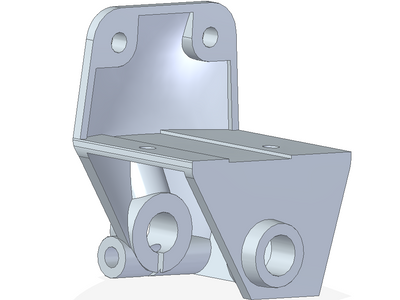MG2022 Advanced CAD Modelling and Rapid Prototyping, Project Course 6.0 credits

NB! This course is replaced by MG2122 Advanced CAD from autumn semester 2023!
The overall goal of this course is to make you familiar with most of the functions for part modelling in one state-of-the-art CAD system for mechanical design. As a result, you will become an advanced user of the system that we are using, Solid Edge from Siemens Digital Industries Software, but that is an effect, rather than a goal. The skills you acquire during this course could be applied in any modern CAD system from the major vendors, as the functionality and modelling methodology is, if not identical, at least very similar between these systems[1].
Besides the advanced CAD part, there is also a small module in the course on design and preparation for additive manufacturing (alias 3D printing/rapid prototyping/freeform fabrication, …). This module includes an exercise and a small project task, where you are given the opportunity to design and manufacture a model of your own choice, using our FDM machine.
[1] The dominant systems for mechanical CAD are: CATIA and Solid Works from Dassault Systèmes; NX and Solid Edge from Siemens PLM Software; Creo from PTC; Inventor from Autodesk Inc.
Content and learning outcomes
Course contents
Advanced CAD usage:
- Advanced solid modelling operations
- Modelling of parts with complex shapes and freeform surfaces
- Diverse and unconventional metodologies for CAD work
- Modelling operations for sheet metal parts
Manufacturing adaptation and preparation for manufacturing in Rapid Prototyping equipment
Intended learning outcomes
After passing the course, the student should be able to:
- use the full functionality of a modern CAD system to create high quality CAD models of parts with complex shapes, using a structured work method
- interpret 2D drawings and use them as a reference for creating 3D CAD models
- reflect upon and describe the development of his/her CAD skills during the course
- adapt and prepare CAD models for additive manufacturing
Literature and preparations
Specific prerequisites
MF1061 Design and Product Realization, Introduction
or
MJ1103 Introduction to Mechanical Engineering
or
MF1001 Mechanical Engineering, introductory course
or
MG1028 Introductory CAD
or the equivalent
Swedish B and English A or equivalent
Recommended prerequisites
Equipment
Literature
Can be downloaded from Canvas by registered course participants
Examination and completion
If the course is discontinued, students may request to be examined during the following two academic years.
Grading scale
Examination
- INL1 - Homework Assignment, 3.0 credits, grading scale: A, B, C, D, E, FX, F
- LAB1 - Laboratory Exercises, 3.0 credits, grading scale: P, F
Based on recommendation from KTH’s coordinator for disabilities, the examiner will decide how to adapt an examination for students with documented disability.
The examiner may apply another examination format when re-examining individual students.
Opportunity to complete the requirements via supplementary examination
Opportunity to raise an approved grade via renewed examination
Examiner
Ethical approach
- All members of a group are responsible for the group's work.
- In any assessment, every student shall honestly disclose any help received and sources used.
- In an oral assessment, every student shall be able to present and answer questions about the entire assignment and solution.
Further information
Course room in Canvas
Offered by
Main field of study
Education cycle
Add-on studies
Contact
Supplementary information
A minimum of 10 participants required for the course.